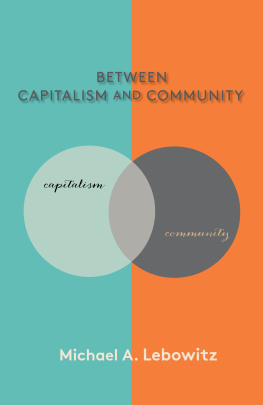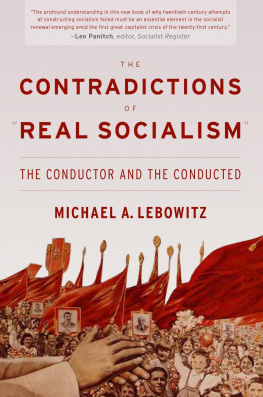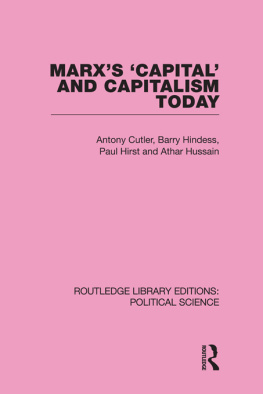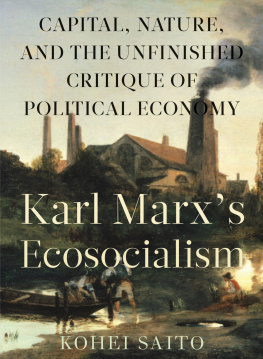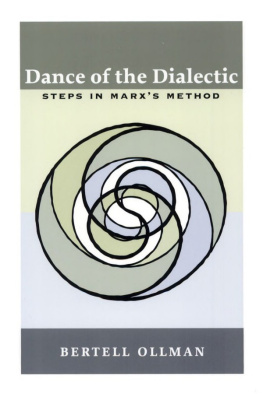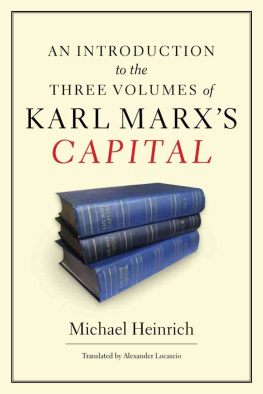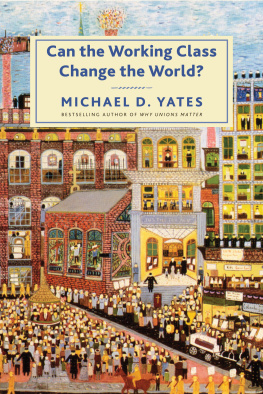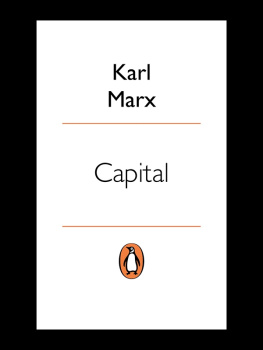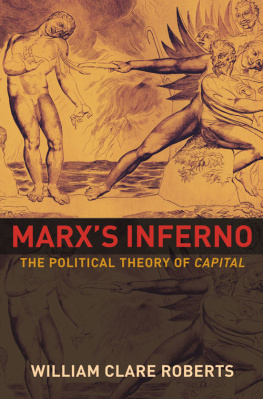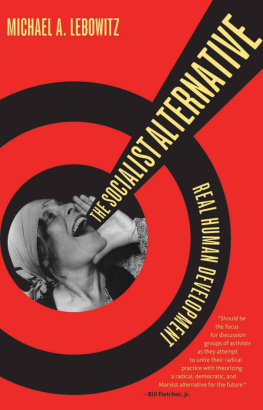
MORE PRAISE FOR BETWEEN CAPITALISM AND COMMUNITY
For some time now Michael Lebowitz has been patiently and provocatively remaking our conception of Marxs Capital and the potential for human development. In standing against a one-sided reading of Marx for an insistence on seeing workers struggling to make their own world, Lebowitz has pushed to the side stale, top-down theses of social transformation through statist planning set apart from workers organization and participation. Indeed, in his essential new book it is the building of workers capacities and communities that transforms circumstances and contexts in a process of contested reproduction against capital. This is a directive to think of community not as a romanticized place standing against the storms of an outside world, but community as a process of struggle to meet and self-govern over common needs against the ceaseless demands of accumulation, alienated work, and the vandalism of the earth. Could any text be more important to read, discuss, and debate in the harsh times we face today?GREG ALBO, Professor of Political Economy, York University; coeditor, The Socialist Register
Michael Lebowitz is certainly no faithful disciple of Marx. But he can claim to incarnate the best type of Marxist that we need to break the circle of the capitalist rush to the destruction of the planet and the post-socialist ideological paralysis: resuming the critique of the economy at the point of Ricardos default, where Marx himself had backed, and pushing the dialectical idea of contested reproduction to the lively conflict of the two histories that inhabit our world and our lives. A book as clear and straightforward as it is radical.ETIENNE BALIBAR, coauthor, Reading Capital
This book should be mandatory for all economics, political science, and social philosophy classes. Comradesespecially younger oneswill find it immensely helpful for years to come. The sweep of the work is truly impressive; comprehensive and clear on everything essential for understanding the horrors of capitalism and the paths toward a better world.TONY SMITH, Professor of Philosophy and Political Science, Iowa State University
In twelve concisely and clearly written chapters, Lebowitz, among the best radical economists in the world, shows that in Capital, Marx failed to fully appreciate that the accumulation of capital results in two productscommodities of all kinds and the workers themselves. The latter, the second product of capitalist production, is shaped by capital so that the working class is both badly divided and not fully cognizant of an all-encompassing alienation. Equally missing from Capital is a full grasp of how the collective actions of workers not only improve their life circumstances but also radically change them, preparing them to become societys eventual protagonists, those who will abolish capitalism and create the collective commonwealth, which alone can overcome the multiple crises that now confront us, especially ecological disaster.MICHAEL D. YATES, author, Can the Working Class Change the World?
In this admirable and timely book, Michael Lebowitz deepens and extends the understanding of capitalism that he developed in his prize-winning Beyond Capital. He argues persuasively that building critically on Marxs conceptualisation of capitalism as an organic system is indispensable to diagnosing the ills of the contemporary worldin particular the growing crisis of the Earth System that threatens to overwhelm us.ALEX CALLINICOS, former Professor of European Studies, Kings College London
In this insightful contribution, Michael Lebowitz continues to rigorously demonstrate the one sidedness of Marxs understanding of capitalism in Capital and shifts Marxism, as a dialectical and systems view of the world, to new ground. It is essential reading to understand the importance of solidarity in these times of senile and catastrophic capitalism.VISHWAS SATGAR, Principal Investigator Emancipatory Futures Studies; Editor of the Democratic Marxism series, University of the Witwatersrand, South Africa
This book is a provocation, as much for traditional Marxists as for the various schools of nontraditional Marxism. It puts the question on the table of whether Marxs Capital could be an obstacle for understanding class struggle and revolutionary practice. Michael Lebowitz questions what is taken for granted by the majority of Marxists. He draws conclusions from this critique, which also influences the offered vision of a non-capitalist future.MICHAEL HEINRICH, author, Karl Marx and the Birth of Modern Society
BETWEEN CAPITALISM AND COMMUNITY
MICHAEL A. LEBOWITZ

MONTHLY REVIEW PRESS
New York
Copyright 2020 by Michael A. Lebowitz
All Rights Reserved
Library of Congress Cataloging-in-Publication Data
available from the publisher
ISBN paper 978-1-58367-886-2
ISBN cloth 978-1-58367-887-9
Typeset in Minion Pro and Brown
MONTHLY REVIEW PRESS, NEW YORK
monthlyreview.org
5 4 3 2 1
Contents
There are those that struggle all of their life.
They are the indispensable ones.
BERTOLD BRECHT, IN PRAISE OF THE FIGHTERS
For Marta Harnecker (19372019)
Popular Educator. Indispensable.
Preface
I am not a disciple of Marx. My goal is not to prove that Marx was right. This, Marx knew, is how a theory disintegrates. Commenting upon the disciples of Hegel and Ricardo, he argued that disintegration of a theory begins when the point of departure is no longer reality, but the new theoretical form in which the master had sublimated it and, accordingly, when the disciples are driven to explain away the often paradoxical relationship of this theory to reality. Unfortunately, Marxs disciples often have embraced the Two Whatevers: Whatever is in Capital is right, whatever is not in Capital is wrong.
But the problem is not only what disciples do. Marx understood that the master, for whom the science was not something received, but something in the process of becoming, may fall into one or another apparent inconsistency through some sort of accommodation. And this, I demonstrate, is precisely what occurred in Capitalan accommodation that produced theoretical blindness.
Why does this matter? It matters if theoretical deficiencies hinder what must be our goal, which is to end this destructive system of capitalism and to replace it with a new society based upon communality and solidarity. It matters if Capital obscured capitals immanent drive and constant tendency to divide the working class. It matters if the centrality of revolutionary practice, that simultaneous changing of circumstance and self-change that promotes the development of the capacities of the working class, plays no apparent role in Capital. It matters, in short, if we are to know how capitalism continues and what can bring it to an end.
Between Capitalism and Community continues my exploration of the continent that Marx discovered, a journey that began in 1982 with an article, The One-Sidedness of Capital, which was followed by Beyond Capital: Marxs Political Economy of the Working Class (1992, 2003).
Between Capitalism and Community begins not with the logic of capital but by considering the relation between a whole and its parts. From this dialectical perspective, our critique is deeper. We conclude that Marxs intellectual construct of capitalism as an organic system, a system of reproduction that produces its own premises, neither represents the logic of capital correctly nor reveals those elements in the concrete whole of capitalism that point to a different organic system, that of community.
Next page
